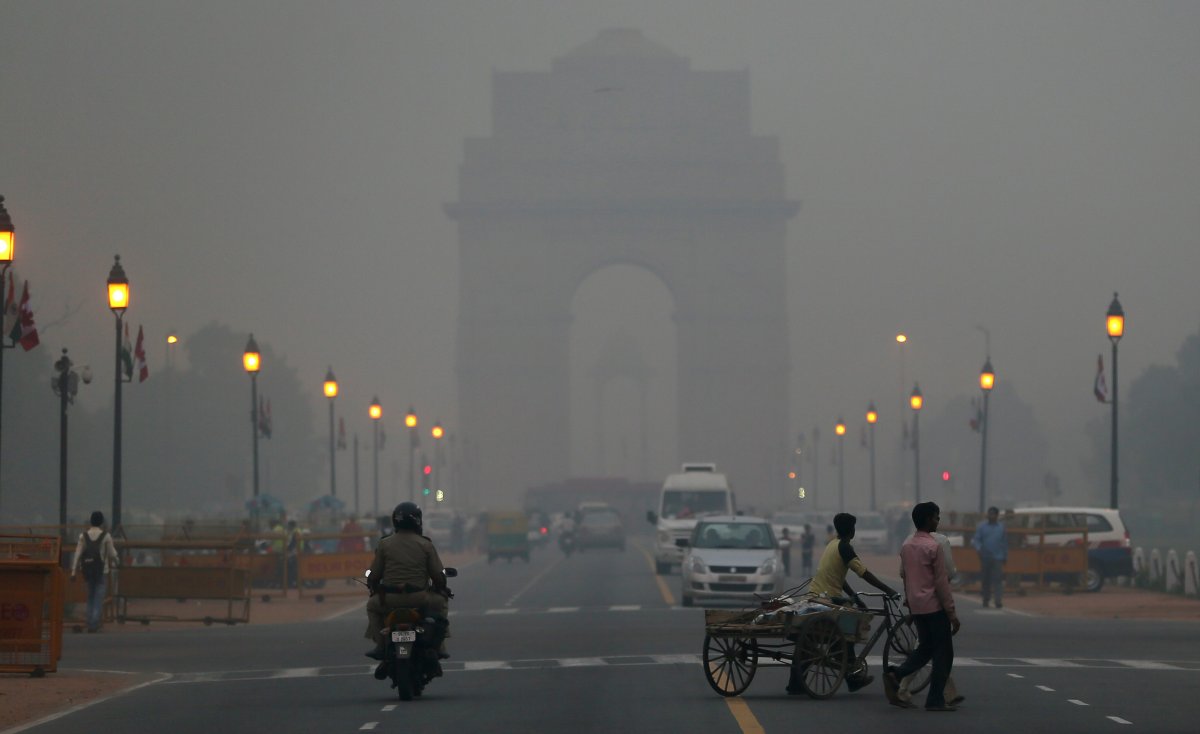


The thick layer of haze enveloping Delhi and the National Capital Region (NCR) has resulted in an alarming increase in eye-related health problems. Due to the city's hazardous air conditions, there has been a surge in patients seeking treatment for eye diseases, with a 20-30% increase in the past fortnight. Eye specialists have warned that pollution is wreaking havoc on the body's most sensitive organ, and as long as the pollution levels remain high, it is crucial to take proper precautions while stepping outdoors. Dr Nidhi Sharma, a senior eye specialist, has shared 11 tips to safeguard your eyes during this hazardous period, including refraining from wearing contact lenses and avoiding eye makeup.
Toxic Haze Triggers Spike in Eye Problems in Delhi
Delhi, India, is grappling with a severe air pollution crisis, resulting in a surge in eye-related health issues. The thick layer of haze enveloping the city and the National Capital Region (NCR) has triggered a 20-30% increase in patients seeking treatment for eye diseases in the past two weeks.
Pollution's Impact on Eye Health
Prolonged exposure to polluted air can wreak havoc on the eyes, which are among the body's most delicate organs. Air pollutants, such as particulate matter and chemicals, can irritate and damage the eyes' surface, leading to symptoms such as:
Precautionary Measures
Eye specialists urge residents to take precautions while venturing outdoors during this hazardous period. Top tips to safeguard eye health include:
FAQs
Q1: Is the current eye problem surge in Delhi an isolated incident? A: No, similar surges in eye problems have been observed during previous pollution crises in Delhi and other cities.
Q2: What are the long-term effects of air pollution on eye health? A: Prolonged exposure to air pollution can increase the risk of developing eye diseases such as cataracts, glaucoma, and macular degeneration.
Q3: What are the government measures being taken to address the pollution problem? A: The Delhi government has implemented measures such as the Odd-Even rule to reduce traffic pollution. However, the challenge remains significant.
Q4: Are there any other health concerns related to the current air pollution in Delhi? A: Yes, air pollution can also lead to respiratory and cardiovascular issues, especially among vulnerable populations.
Q5: What should residents do to protect their health during this crisis? A: Residents are advised to limit outdoor activities, wear protective masks, and stay hydrated. They should also consult a physician if they experience any symptoms of eye irritation or other health concerns.

A spiritual education institution in Maharashtra, India is under investigation after a student reported sexual harassment by the head and a teacher. The student spoke out to authorities after being warned not to by the teacher and faced threats of repercussions if she did so. Both accused have been detained for questioning and a thorough investigation is being conducted. The incident has sparked concerns about transparency and external affiliations within the institution.

Environmental activist and founder of nonprofit Chintan, Bharati Chaturvedi, shared a frightening encounter with an Uber driver in Delhi on social media. Chaturvedi alleged that when she tried to stop the driver, he grabbed and twisted her arm and the city's women's helpline did not respond to her distress call. She also expressed frustration at the lack of immediate help and questioned how women in emergencies could reach authorities.

Good Friday 2024, happening two days before Easter Sunday, marks a significant day for Christians worldwide as it commemorates the crucifixion and death of Jesus Christ. It is a time for solemn reflection and contemplation as believers remember the ultimate sacrifice made for them. This year, Good Friday falls on March 29, and will be observed by Christians in various ways, including special services and prayers.

Vantara, a wildlife rescue and rehabilitation initiative by Reliance Foundation, has been cleared of all allegations of wrongdoings by the Supreme Court-appointed SIT. This validation of their work has given them the strength to continue their mission of serving voiceless animals with love and compassion. Vantara also expresses their gratitude and solidarity with the government and all stakeholders involved in animal care.

On November 16th, India commemorates National Press Day to acknowledge the vital role of the media in shaping the nation's democratic framework. As the Fourth Pillar of Democracy, the press serves as both a chronicler of truth and a watchdog that keeps those in power accountable. However, the day also serves as a reminder of the ongoing obstacles and challenges that threaten press freedom, including misinformation and censorship attempts. As we celebrate India's rich press history and honor journalists who bravely bring truth to the public, it is also an opportunity for reflection on the responsibility of the media and the need for independent journalism in a rapidly evolving digital landscape.

Rohini Acharya, the daughter of RJD party president Lalu Prasad, shocked everyone with her recent decision to quit politics and disown her family. In her cryptic post on X handle, she reveals that it was Sanjay Yadav and Rameez who convinced her to do so. Sanjay Yadav, a trusted aide of Tejashwi Yadav, and Rameez, an old friend of Tejashwi's, are believed to be the ones who influenced her decision. With the RJD's seat tally slipping to 24 from 75 in the recent Bihar assembly polls, many speculate that Rohini's decision may be linked to the expulsion of Tej Pratap Yadav from the party. However, details about her background and the story behind her name add more context and depth to the shocking news.

A four-year-old girl, who was kidnapped from Mumbai's Chhatrapati Shivaji Maharaj Terminus six months ago, has been reunited with her parents after being traced to a Varanasi orphanage. After an extensive six-month long search, the police were finally able to rescue the girl and bring her back to her family in Mumbai. The breakthrough came when a local journalist contacted the Mumbai police after spotting the missing child's poster. This heartwarming reunion highlights the importance of collaborative efforts and the power of media in solving such cases.

The AIMA MAT CBT mode exam 2025 admit card will be available for download today, September 25, 2025, on the official website. Candidates appearing for the exam on September 28 will be able to download their admit card through the link provided. The admit card is mandatory and can be downloaded by logging in with the registration number and password on the official website. Here's how to download the MAT CBT admit card 2025.

A recent study has found that six Indian states consistently have the cleanest air due to their geographical and environmental factors. With Delhi's air quality reaching "severe" levels, these states provide a welcome respite from pollution. Experts believe that nature and low population density are key contributors to their clean air. Follow us on Instagram for more updates on environmental issues across India.

The festival of Prathamastami in Odisha honors the eldest child in a deeply meaningful way, emphasizing blessings, responsibility, and family traditions. With roots in both agriculture and Hindu worship, the day involves key rituals such as worship of Hindu gods and goddesses, offerings to the eldest child, and blessings from elders. The day also holds a special role for the maternal uncle, who presents gifts and support to the child. Overall, Prathamastami is a day for families to express gratitude for their children and the continuity of their values.